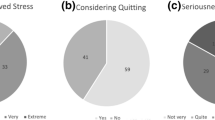Abstract
The paper describes the rationale and contents of a graduate-level practicum on stress management. The course objective is consistent with the current call for improved training in psychological issues in medical education. Participants were 39 occupational health practitioners (physicians, industrial hygienists, nurses, and physiotherapists) in the Tel-Aviv University Medical School graduate program in occupational health. Twenty-five students in the same program who did not participate in the practicum were included as comparison subjects. The course was based on a cognitive-behavioral model (Rational-Emotive Behavior Training) developed by Ellis. The one-semester practicum aimed to reduce irrational/dysfunctional thinking patterns which are considered to be causal factors in stress etiology. Irrationality was significantly reduced by the end of the course and perceived psychosocial professional efficacy was increased. The improvements in such personal anti-stress resources may benefit health workers and clients alike. It is recommended to include such courses to the professional training of all health care practitioners.
Similar content being viewed by others
REFERENCES
A Committee Report (1981). Careers in occupational medicine. Journal of Occupational Medicine, 23, 122–125.
Balint, M., & Balint, E. (1961). Psychotherapeutic techniques in Medicine. Mind and medicine monographs. London: Tavistock.
Bandura, A. (1989). Human agency in social cognitive theory. American Psychologist, 44, 1175–1184.
Cherniss, C. R. (1993). Role of professional self-efficacy in the etiology and amelioration of burnout. In W. B. Schaufeli, C. Maslach, & T. Marek (Eds.), Professional burnout: Recent developments in theory and research. Washington, DC: Taylor & Francis.
Davis, M. (1982). The relaxation and stress reduction workbook. Oakland, CA: New Harbinger Publications.
DiMartino, V. (1992). Preventing stress at work. Overview and analysis. In Conditions of work digest. Vol. 11, Preventing stress at work. Geneva: ILO.
Ellis, A. (1976). The biological basis of human irrationality. Journal of Individual Psychology, 32, 145–163.
Ellis, A. (1979). Theoretical and empirical formulations of rational-emotive therapy. Monterey: Brooks/Cole.
Ellis, A. (1991). RET effectiveness: Reflections and interview. In M. E. Bernard (Ed.), Using rational emotive therapy effectively: A practitioner's guide. New York: Plenum Press.
Ellis, A., & Dryden, W. (1987). The practice of rational emotive therapy. New York: Springer-Verlag.
Felton, J. S. (1988). Role of the occupational physician in mental health services. Occupational Medicine: State of the Art Review, 3(4).
Goldberg, D. P., Jenkins, L., Millar, T., & Faragher, E. B. (1993). The ability of trainee general practitioners to identify psychological distress among their patients. Psychological Medicine, 23, 185–193.
Ireton, H., & Hilliard, R. (1983). Teaching behavioral medicine by consultation in the family practice center. Journal of Family Practice, 17, 93–97.
Ireton, H., & Sherman, M. (1988). Self ratings of graduating family practice residents' psychological medicine abilities. Family Practice Research Journal, 7, 236–244.
Kushnir, T., & Malkinson, R. (1993). A rational-emotive group intervention for preventing and coping with stress among safety officers. Journal of Rational-Emotive & Cognitive-Behavioral Therapy, 11, 195–206.
Kushnir, T., Malkinson, R., & Ribak, J. (1994). Teaching stress management skills to occupational and environmental health physicians and practitioners. A graduate-level practicum. Journal of Occupational Medicine, 36, 1335–1340.
Lazarus, R. S., & Folkman, S. (1984). Stress, appraisal and coping. New York: Springer-Verlag.
Malkinson, R., Kushnir, T., & Weisberg, E. (1997). Stress management and burnout prevention in female blue-collar workers: Theoretical and practical implications. International Journal of Stress Management, 4, 183–195.
Meichenbaum, D. (1985). Stress inoculation training. New York: Pergamon Press.
Novack, D. H. (1987). Therapeutic aspects of the clinical encounter. Journal of General Internal Medicine, 2, 346–355.
Novack, D. H., Volk, G., Drossman, D. A., & Lipkin, M. (1993). Medical interviewing and interpersonal skills teaching in U.S. medical schools. Journal of American Medical Association, 269, 2101–2105.
Rabinowitz, S., Melamed, S., Feiner, M., et al. (1996). Hostility and hearing protection behavior: The mediating role of personal beliefs and low frustration tolerance. Journal of Occupational Health Psychology, 1, 375–381.
Smith, R. E. (1989). Effects of coping skills training on generalized self-efficacy and locus of control. Journal of Personality and Social Psychology, 56, 228–233.
Warren, R., & Zgourides, G. D. (1991). Anxiety disorders: A rational-emotive perspective. Elmsford, NY: Pergamon Press.
Warshaw, L. J. (1989). Stress, Anxiety and Depression in the Workplace. Report of the NYBGH/Gallup Survey. New York: Conference on Stress, Anxiety and Depression in the Workplace.
WHO (1981). Education and Training in Occupational Health, Safety and Ergonomics. Eighth report of the Joint ILO/WHO Committee on Occupational Health. WHO Technical Report Series, No. 663, World Health Organization, Geneva.
WHO (1988). Training and Education in Occupational Medicine. WHO report of a WHO Study Group, World Health Organization Technical Report Series 762. World Health Organization, Geneva.
Author information
Authors and Affiliations
Rights and permissions
About this article
Cite this article
Kushnir, T., Malkinson, R. & Ribak, J. Rational Thinking and Stress Management in Health Workers: A Psychoeducational Program. International Journal of Stress Management 5, 169–178 (1998). https://doi.org/10.1023/A:1022941031900
Issue Date:
DOI: https://doi.org/10.1023/A:1022941031900




